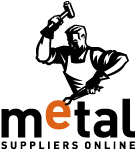Metal Sourcing - An Introduction
Sourcing is an Art
Most inquiries you get will be easy - check stock and quote OR, log on to MSO, find suppliers, send an email or call to get prices, markup and quote. This will probably represent 80-90% of the RFQ's you see. The other 10-20% are potential opportunities, but it takes skill to decide whether or not they are profitable opportunities.
Anyone can source metal - it takes a true master to profitably run down the tough ones.
The truest definition of a master sourcing professional is a person who intuitively knows when to take the time to quote an alternative. Developing that intuition takes time as well as a sense of just what can and can't be reliably produced to meet a clients needs.
Keys to Outsourcing Success
Round Bar is NOT Round Bar, Pipe is NOT Pipe
A round bar is nothing more than a solid cylindrical piece of metal, pipe is nothing more than a cylinder with a hole in it. When facing a challenging sourcing challenge, be creative and think of how that round bar or pipe can be produced - forging, sawing, grinding, casting, etc....
Study & Learn the Alternate Production Methods
Becoming a sourcing pro takes time and effort. The best of the best know intuitively just what is and is not possible. Make the time to learn each and every process - what sizes can be economically produced by an open die forge shop, centrifugal caster, precision saw cutting company, etc.
I HIGHLY recommend a physical visit to one of these companies to fully understand how they operate and what they can do to make you a better out-sourcing pro.
Ask Lots of Questions
Deciding which RFQ's are worth pursuing is key. The only way to make the right decision is to get as much information as possible.
If the customer asks for a 12" round bar and the maximum available in the industry is 6", ask how long his parts are, how many he's making, what specification he needs it certified to and how much time he has - could this be cut from plate?, Forged to size?
If the client wants 24" OD welded tubing and the maximum stock size is 20", again, what’s the spec, cut length, required lead time - this could be rolled and welded, if plate is available at the wall thickness he requires, it could be centrifugally cast if the wall thickness is too heavy for plate, it could be forged as a mandrel ring - if the ID is tiny in relation to the OD, could it be bored from a solid round bar?
Learn When to Say No
It really comes down to pre-qualifying the client as well as the RFQ. Here are some client pre-qualification questions:
Is this a client that you know?
Do they buy from you regularly?
Does the client have an order to place and if yes, how did they initially quote the job if the metal in question is simply not available from stock?
Does the client have a shut-down or AOG (aircraft on the ground) situation?
SRM
As important as CRM is to a winning relationship with a client, SRM (Supplier Relationship Management) is equally important.
Develop a solid, friendly relationship with a specific person at each supplier company and try to only deal with that person. Document conversations, their likes and dislikes, any information that you can to build the relationship - especially important if you only contact that company occasionally. What sports teams do they like, hobbies, etc....all very important

